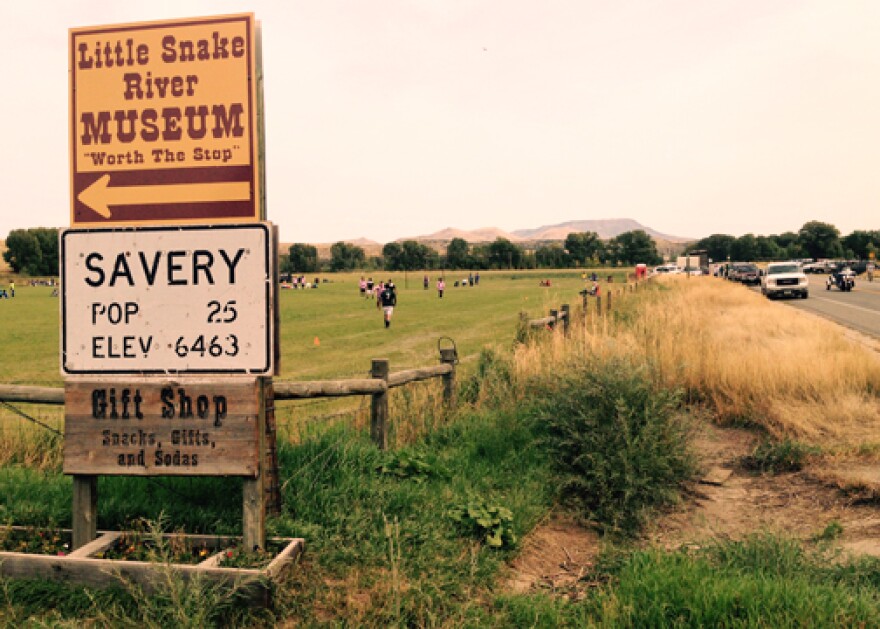Bright neon uniforms speckle a usually empty hay field in the sleepy town of Savery. Two soccer games are in full swing—and almost all of the players are guest workers—like Dante Bruno.
“We’re here to play sports today,” says Bruno, in Spanish. “We are Peruvians. The majority of us here are Peruvians.”
Bruno, 38, and his teammates wear pink pullovers that read, “Sheehan Ranch.” He’s been working at the ranch--in Baggs, Wyoming—for the past 15 years. Bruno says the work is hard, but not complicated.
“It’s cows,” says Bruno. “Pretty much cows.”
Bruno works here 9 months a year with an H-2A agriculture visa. Through the guest worker program, hundreds of men come from places like Peru, Mexico and Nicaragua to Wyoming and neighboring states every year.

The region’s reliance on these workers is on full display on this Sunday afternoon in Wyoming’s Little Snake River Valley. More than 100 ranch hands are playing on 11 different teams, each sponsored by a different area ranch.
Players on the winning team will get $40 each, a trophy and serious bragging rights among their fellow laborers.
Bruno earns the minimum monthly wage required for his job in the state of Wyoming: $875, plus room and board.
Some guys on the field today make more. Others, less—depending on what state they live in, what work they do, and what the ranchers who hire them are willing to pay. Most workers have all of their living expenses paid for—and send checks back home to their families.

Savery rancher Jack Cobb says he started this tournament 6 years ago to honor their hard work and sacrifice.
“It’s supposed to be a fun day just to get them out and give them a chance to socialize with each other—and just play soccer,” Cobb says.
These migrant workers, most of them Peruvian, have been the lifeblood of Cobb’s industry here for more than a decade.
“Back when I was a kid we had American workers,” says Cobb. “But then as the oil gas field developed, they went to higher paying jobs and we went through the Mexican labor. And then they went looking for higher wages. And so, the Peruvian, through an H-2A program, has just saved the ranching community.”
But now, Cobb says, the industry is in trouble again. This year, the Department of Labor proposed rules that would more than triple the $750 base wage he’s required to pay his Peruvian sheepherders to $2,400.
“That’s going to be devastating,” says Cobb. “For communities like this that are small family ranching, they’re going to die.”

James Kelly Sewell, who manages the Lazy C 2 Bar Ranch in nearby Slater, Colorado, disagrees.
“You know, I have no problem if we need to pay these guys more, because they’re worth every penny of it,” Sewell says.
“There’s too many of these Peruvians working at base wage,” says Sewell. “In this day and age, $650, $750 a month is not enough money. So, $1,200, $1,500, $2,000—they’re worth it.”
Sewell’s H-2A workers earn $1,200 a month.
Trade groups say the new regulations will cripple sheep ranches and grazing operations, but Sewell thinks employers can afford it.

He stands on the sidelines as his ranch’s team pulls out a win.
“This is just a big deal for these guys—they wait a year to play,” says Sewell. “It’s quite something to take home that trophy. It’s a big day. Most of these guys will be so sore tomorrow they can hardly work, but none of us care.”

Reports of abuse, fraud and poor conditions have long plagued the country’s guest worker program. A 2010 survey of sheepherders in Colorado, Wyoming and Utah found that more than 70 percent lacked toilets in their employer-provided housing—and half
“I’m so happy here, working here, because this is the part of the country that I like,” says Nario Quispe Reymundo, a Peruvian ranch worker in Steamboat Springs, Colorado
Reymundo first came to this area on a 3-year sheepherder visa. He later traded up for summers doing cowboy work in Steamboat. He says he sends most of his paycheck home to his son in Lima.
“I like being a cowboy,” Reymundo says. “It’s more easy for me. I don’t really like the sheep.”

Beside him, a mob has gathered around a game ending in a heated shootout. Debbie and Carolyn Adams watch from the sidelines as their team ‘Adam’s Livestock’ takes penalty kicks.
“They’re fun to come and support,” says Carolyn. “We’re their cheerleaders.”
Debbie says they come and watch this tournament every year.
“Most all these guys are going home,” says Debbie. “End of September, they’re all going home. This is what the community does for the guys, because they love it.”

But there’s uncertainty as to how many of these guys will be back here next year. Higher wage requirements could mean fewer visa hires. But right now, says Nicaraguan guest worker CristianGurdian, these men are busy just enjoying the day.
“It’s really great because we get to get together and have fun,” Gurdian says. “We’re all very content and happy.”







